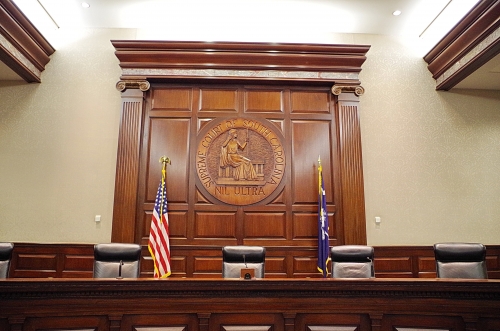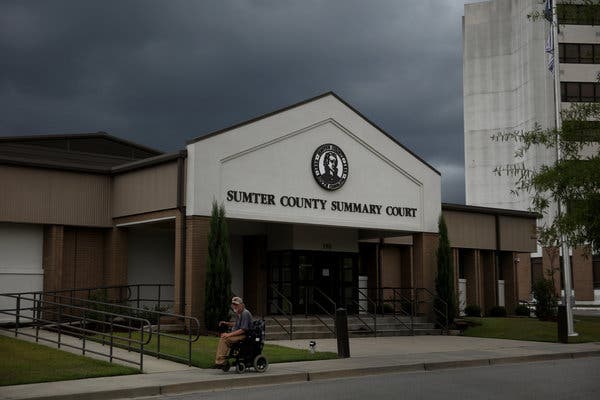SC’s New Chief Justice Shuts Down Magistrate Court Conflicts of Interest
This morning, South Carolina’s new Chief Justice John Kittredge released a new administrative order that brings long-awaited reform to South Carolina’s magistrate court system and shuts down potential for conflict of interest in magistrates’ rulings on cases involving lawyer-legislators.
Palmetto Promise has written extensively over the last few years about the need for reform in the state’s magistrate courts, and we are pleased to see Chief Justice Kittredge taking seriously the concerns many have raised about the potential for conflicts of interest in the current system.
South Carolina’s Constitution states that magistrates should be appointed by “the governor, by and with the advice and consent of the Senate.” But in practice, there is a history of the Senate rubberstamping nominees handpicked by a county’s senator(s), without much of a second glance at a candidate’s record or qualifications. This is South Carolina’s only court where a few legislators (if not just one, like in the 12 counties represented by just one Senator) are solely able to pick a judge.
Many members of the state Senate are practicing attorneys who can appear in court before the very magistrate judge they appointed. This puts magistrate judges, who must be reappointed every four years, in a tricky situation. The system incentivizes magistrates to always rule in favor of the Senator who ensures their job security and reappointment.
Even if the Senator and Judge involved are acting perfectly ethically and are able to separate their political relationship and their relationship in the courtroom, it is the appearance of corruption and impropriety that gives us pause. South Carolina citizens should be able to have full confidence in our state’s judiciary to rule according to law and not any personal ambition.
There have been many suggestions on how to fix this conflict of interest, whether it is bringing the House into the magistrate appointment process (a change requiring a Constitutional amendment) or passing a law limiting what lawyer-legislators can do in the courtroom. Unfortunately, the landmark judicial reform bill that passed the General Assembly earlier this year did not include any magistrate reforms, with legislators promising to take up the matter in standalone legislation in 2025.
However, today’s order from Chief Justice Kittredge is a thoughtful and immediate fix to this major problem in magistrate courts.
He writes:
“South Carolina State Senators who are also lawyers have a dual responsibility. State Senators participate in the legislative process and have an important role representing the interests of the citizens of South Carolina who elected the State Senator to the Legislature. As part of that duty to the citizens of South Carolina, a Senator may recommend a magistrate to the Governor for appointment. However, in addition to the role of legislator, the lawyer State Senator, like all lawyers, is an advocate and has the duty to zealously represent clients. This dual responsibility may lead the public to question the impartiality of the magistrate. Public confidence in the judiciary is paramount. Our justice system must not only provide equal justice to all, the public must believe in the integrity of our justice system. State Senators also recognize that appearances matter in our justice system.”
Thus, the Chief Justice orders that “a magistrate may not hear any contested matter involving a state Senator, as a party or attorney, who has direct authority to recommend the magistrate for appointment to the Governor.” He extends this rule to any partners at a Senator’s law firm or family members of the Senator who may also be attorneys. Should a lawyer Senator be involved in a contested case that goes to magistrate court, “the Chief Magistrate shall assign the case to a conflict-free magistrate,” and Court Administration can help supply a conflict-free magistrate promptly.
You can read Chief Justice Kittredge’s full order here.
This new rule is a tremendous win for judicial integrity in South Carolina. Senators who work as attorney are still able to pursue their career, but now there are safeguards to keep magistrate judges from having to rule on a case involving the Senator who appoints them. We applaud the Chief Justice’s order and believe it will greatly benefit our state.
This rule, however, does not remove the onus on legislators to pass a full magistrate reform bill in 2025. There are many other changes needed for South Carolina’s magistrate courts to operate fairly and effectively, and we hope to see this legislation prioritized.
(Chief Justice Kittredge released another order today regarding lawyer-legislators, this one to protect lawyer-legislators from having trials scheduled during the legislative session that may interfere with their ability to represent their constituents in the Statehouse. You can read that order here.)




